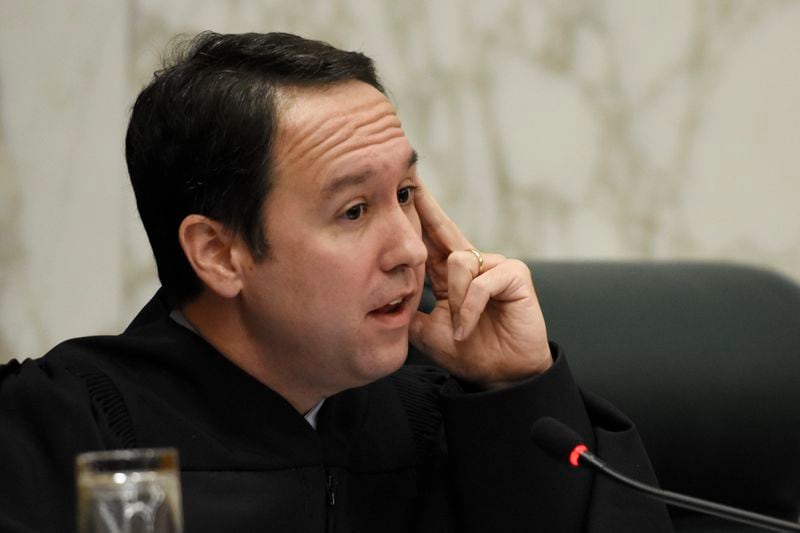The Georgia Supreme Court on Monday rejected a challenge to the state’s “fetal pain” law, ruling citizens may not sue the state when trying to overturn a law they believe is unconstitutional.
The landmark ruling said the state, its agencies and its officials are shielded from litigation under the legal doctrine of sovereign immunity, rooted in a centuries-old English principle that “the king can do no wrong.”
“Simply put, the constitutional doctrine of sovereign immunity forbids our courts to entertain a lawsuit against the state without its consent,” Justice Keith Blackwell wrote for a unanimous court.
Longtime Atlanta plaintiffs’ attorney Lee Parks said the ruling tramples on the principle of “government by the people, for the people.”
“No matter how bad the sovereign is, no matter how many heads I chopped off, I had the right to do it,” Parks said of the sovereign immunity doctrine. “No one’s disputing that the (“fetal pain”) statute is unconstitutional. But they’re saying, ‘We can’t do anything about that.’”
Monday’s ruling does not affect citizens’ rights to challenge the constitutionality of a state law in federal court. At the state level, however, citizens may not sue “the state” to overturn an unfair law. Instead, they may only sue an individual official to stop him or her from enforcing the law.
In 1973, the U.S. Supreme Court upheld a woman’s right to abortion until a fetus is viable — now considered to be about 24 weeks after conception. But legislation enacted five years ago in Georgia said the state has an interest in protecting fetuses after 20 weeks because they are capable of feeling pain.
The law says doctors who perform abortions after the 20-week threshold can be charged with a felony and face up to 10 years in prison. It also gives district attorneys access to abortion patients’ medical records.
Three OB-GYN doctors in Georgia filed suit to halt the “fetal pain” law, saying it violates the state’s constitutional right to privacy. In Monday’s decision, the state Supreme Court did not rule on the merits of the physicians’ suit.
During arguments and in court filings in the case, the state’s justices were presented with a number of extreme hypotheticals: a law that bans interracial marriage, a statute outlawing gun ownership, a prohibition against Christians holding office.
Would sovereign immunity prohibit Georgia’s courts from considering challenges to such blatantly unconstitutional laws? Does it leave the state’s courts powerless to safeguard the constitutional rights of Georgia citizens? Does it shift the fundamental structure of government, particularly the separation of powers?
In responding to those concerns, Justice Blackwell noted that one principle of Georgia’s Constitution is as much a part of the state Constitution as any other. “(A)nd sovereign immunity is … itself a part of the essential and fundamental structure of our constitutional government,” he wrote.
Unless the state expressly allows it, lawsuits such as those brought by the OB-GYN doctors are barred, Blackwell wrote. And consent can only be provided under the state’s Constitution or by an act of the General Assembly.
The attorney for the three doctors said the ruling represented a technical loss on the question of sovereign immunity, no more.
“The right of citizens in Georgia to sue and invoke the court’s power and enjoin the enforcement of unconstitutional laws survives,” said Atlanta lawyer Don Samuel, who represents the doctors on behalf of the American Civil Liberties Union.
Samuel said the doctors will either amend or refile their lawsuit against government officials individually.
The ACLU had a similar reaction to Samuel’s.
“We appreciate that the court’s decision keeps the courthouse doors open for these very important cases, including our challenge to Georgia’s unconstitutional abortion ban,” said Andrea Young, Executive Director of the ACLU of Georgia.
A spokeswoman for State Attorney General Chris Carr said he was reviewing the decision and had no comment at this time
In his ruling, Blackwell acknowledged that suing government officials individually is not as convenient as filing suit against the state itself.
For example, some government officials who were being sued individually could leave their positions, likely requiring a new lawsuit to be filed against their successors. And there is an open question of whether an injunction issued against a state official in his or her individual capacity would continue to be in effect against that official’s successor, Blackwell said.
Such an inconvenience is “simply a cost of sovereign immunity,” Blackwell wrote. Also, the General Assembly could eliminate such problems by enacting waivers of sovereign immunity for lawsuits such as the one brought by the OB-GYN doctors, he said.
In the 2016 General Assembly, both the House and Senate overwhelmingly passed legislation to allow lawsuits against the state that challenge the constitutionality of a law. But Gov. Nathan Deal vetoed the bill.








